1999 年 6 月北京成人学士学位英语考试真题
Part I Reading Comprehension (40%)
Directions There are four Passages in this part. Each passage is followed by
some questions or unfinished statements. For each of them there are four choices
marked A, B, C and D. You should decide on the best choice and mark the corresponding
letter on the Answer Sheet with a single line through the center.
Passage 1
Questions 1 to 5 are based on the following passage.
"High tech" and "state of the art" are two expressions that describe very modern
technology. High tech is just a shorter way of saying high technology. And high
technology describes any invention, system of device that uses the newest ideas
or discoveries of science and engineering. What is high tech? A computer is high
tech. So is a communications satellite. A modern manufacturing(生产) system is
surely high tech. High tech became a popular expression in the United States during
the early l980's. Because of improvements in technology, people could buy many new
kinds of products in American stores, such as home computers, microwave(微波)
ovens, etc.
"State of the art" is something that is as modern as possible. It is a product
that is based on the very latest methods and technology. Something that is "state
of the art" is the newest possible design or product of a business or industry.
A state of the art television set, for example, uses the most modern electronic
design and parts. It is the best that one can buy.
"State of the art" is not a new expression. Engineers have used it for years,
to describe the best and most modern way of doing something. Millions of Americans
began to use the expression in the late 1970's. The reason was the computer
revolution. Every computer company claimed that its computers were "state of the
art".
Computer technology changed so fast that a state of the art computer today might
be old tomorrow. The expression "state of the art" became common and popular as
computers themselves. Now all kinds of products are said to be "state of the art".
1. What is the purpose of the passage?
A. To tell how "high tech" and "state of the art" have developed.
B. To give examples of "high tech".
�
C. To tell what "high tech" and "state of the" are.
D. To describe very modern technology.
2. What can we infer from the passage?
A. American stores could provide new kinds of products to the people.
B. High tech describes a technology that is not traditional.
C. "State of the art" is not as popular as "high tech".
D. A modern plough pulled by oxen is "state of the art
3. All the following examples are high tech except _________
A. a microwave over B. a home computer
C. a hand pump D. a satellite
4. Which of the following statements is not true?
A. since the computer revolution, the expression "state of the art" has become
popular.
B. "State of the art" means something that is the best one can
C. With the rapid development of computer technology, a state of the tart
computer may easily become out of date.
D. All kinds of products are "state of the art" nowadays.
5. The best title for the passage is __________
A. Computer Technology
B. High Tech and State of the Art
C. Mast Advanced Technology
D. Two New Expressions
Passage 2
Questions 6 to 10 are based on the following passage:
�
Cheating: The income tax deadline (最后期限) approaches and some taxpayer'
s thoughts turn to it. Test time approaches and some students' thoughts turn to
it.
"You want something you can't get by behaving within the rules, and you want
it badly enough you'll do it regardless of any guilt or deep regret~ and you're
willing to run the risk of being caught." That's how Ladd Wheeler, psychology
professor at the University of Rochester in New York, defines cheating.
Many experts believe cheating is on the rise. "We're suffering a moral
breakdown." Pinkard says, "we're seeing more of the kind of person who regards the
world as a series of things to be dealt with. Whether to cheat depends on whether
it's the person's interest ". He does, however, see less cheating among the youngest
students.
Richard Dienabier, Psychology(心理学) professor at the University of Nebraska
in Lincoln, believes that society' s attitudes account for much of the increase
in cheating.
"Twenty years age, if a person cheated in college, society said: That is
extremely serious, you will be dropped for a term if not kicked out permanently,"
he says, "nowadays, at the University of Nebraska, for example, it is the stated
policy of the college of Arts and Sciences that if a student cheats on an exam,
the student must receive an "F' on what he cheated on. That's nothing. If you're
going to flunk anyway, why not cheat?"
"Cheating is most likely in situations where the vital interests are high and
the chances of getting caught are low~" says social psychologist. Lynn Kahle of
the University of Oregon in Eugene.
6. The passage centers on _________
A. convincing the reader that cheating is immoral
B. discussing the reasons for cheating
C. describing how students cheat on exam
D. discussing how to control cheating
7. Cheating tends to occur when ________
A. one wants something badly
�
B. one can't get something in a right way.
C. it is not very likely to be revealed.
D. a series of things has to be dealt with
8. Which of the following is true according to the~ passage?
A. It is forgivable to cheat unless money is involved.
B. There has been a quick increase in cheating.
C. Most cheaters are college students.
D. Cheaters do not feel guilty and regretful.
9. What can be inferred from the passage?
A. Cheating is widespread because society is too tolerant.
B. cheating is the result of intense pressure.
C. Cheating is cheating, whether on a test or on any other occassions.
D. Cheating comes together with civilization.
10. The word "flunk" in paragraph 5 could best be replaced by which of the
following?
A. Fear B. Fail C. Be pleased D. Succeed
Passage 3
Questions 11 to 15 are based on the following passage:
The young people who talk of the village as being "dead" are talking nothing
but nonsense, as in their hearts they must surely know.
No, the village is not dead. There is more life in it now than there ever was.
But it seems that "Village life" is dead. Gone for ever. It began to decline (衰
落) about a hundred years ago, when many girls left home to go into service in
�
town many miles away, and men also left home in increasing number in search of a
work, and home was where work was. There are still a number of people alive today
who can remember. What "village life" meant the early years of the present century?
It meant knowing and being known by everybody else in the village. It meant finding
your entertainment in the village of within walking distance of it. It meant
housewives tied to the home all day and every day. It meant going to bed early to
save lamp -oil and coal.
Then came the First World War and the Second World War. After each war, new
ideas, new attitudes, new trades and occupations were revealed to villagers. The
long - established order of society was no longer taken for granted. Electricity
and the motorcar were steadily operating to make "village life" and "town life"
almost alike. Now with the highly developed science and technology and high - level
social welfare for all, there is no point whatever in talking any longer about
"village life. " It is just life, and that a better life.
Finally, if we have any doubts about the future, or about the many changes,
which we have seen in our lives, we have only to look in at the school playground
any mid - morning; or see the children as they walk homeward in little groups.
Obviously these children are better fed, better clothed, better educated, healthier,
prettier and happier than any generation of children that ever before walked the
village street.
11. By saying that village is not dead, but "village life" is dead, the writer
suggests that _________
A. those young people who talk of the village as being "dead" are wrong
B the two statements are against each other
C. "village life" today is rather uninteresting
D. "village life" today is no longer like what is used to be.
12. It was _________ that "village life" began to take a sharp turn.
A. about a century ago
B. during the two world wars
C. with electricity and motorcars introduced into the village
D. only recently
�
13. As is suggested in paragraph 2, villagers in the past _________
A. lived a simpler life than villagers today
B. knew fewer people than villagers today.
C. found it difficult to enjoy themselves
D. liked to wash themselves with cold water.
14. The expression "…… " There is no point whatever in talking about in
paragraph 3 means that _________
A. there is no end to the talking about……
B. It is harmful to talk about….
C. It is not meaningless to talk about……
D. there is no reason for talking about
15. From the passage we can see that the writer's attitude toward "village life"
is ___________
A. positive B. negative
C. neutral D. unclear
Passage 4
Questions 16 to 20 are based on the following passage.
We all know that it is possible for ordinary people to make their on the equator
(赤道), although often they may feel uncomfortably hot there. Millions do it.
but as for the North Pole(北极)—— we that it is not only a dangerously cold
place, but that people like you and me would find it quite impossible to live there.
At the present time only the scientists and explorers can do so, and they use special
equipment. Men had been traveling across and around the equator on wheels, on their
feet or in ships for thousands of years; but only a few men, with great difficulty
and in very recent time, have ever crossed the ice to the North Pole. So it may
surprise you to learn that, when traveling by air, it is really safer to fly over
the North Pole than over the equator. Of course, this is not true about landings
�
in the polar region (which passenger aeroplanes do not make), but the weather,
if we are flying at a height of 5,000 meters above the Pole, is a delight. At 4
000 meters and more above the earth you can always be that you will not see a cloud
in the sky as far as the eye can reach. In the tropics (热带), on the other hand,
you are not certain to keep clear of bad weather even at such heights as 18,000
or 20,000 meters.
Aeroplanes can't climb as high or as quickly in cold air as in warm. Nor can
clouds. In practice, this is an advantage to the aeroplane, which is already at
a good height when it reaches the polar region and so does not need to climb, while
at the same time cold air keeps the clouds down low.
16. "Millions do it." In this sentence "do it" refers to _________
A. feeling uncomfortably hot on the equator
B. flying over the North Pole
C. flying over the equator
D. making homes on the equator
17. The polar region is ________
A. a good place to land at by aeroplane
B. a good place to fly over
C. a good place to fly over
D. a good place to live in
18. It is a delight to fly at the Pole because there _________
A. planes fly higher than at the equator
B. the eyes can reach about 4,000 meters
C. planes are clear of bad weather
D. planes fly more quickly than at the equator.
19. Aeroplanes can climb quickly ________
�
A. in warm air
B. in cold air
C. when it reaches the polar region
D. only when the clouds are down low
20. Aeroplanes usually do not need to climb quickly or fly high in the polar
region because _________
A. they do not land there
B. there are no clouds at all
C. they can cross the ice with special equipment
D. it is very cold
Part I Vocabulary and Structure (40%)
Directions2 In this part there are 40 incomplete sentences. For each se there
are four choices marked A, B, C and D. Choose the ONE answer ~ best completes the
sentence. Then mark the corresponding letter on the Answer Sheet with a single line
through the center.
21. He knows little of English to say ____ of English culture.
A. something B. everything
C. nothing D. anything
22. Being ignorant of the law is no ______ of breaking the law.
A. reason B. excuse
C. ground D. point
23. The new law, it is said, will be ____
A. put into effect B. taken into account
�
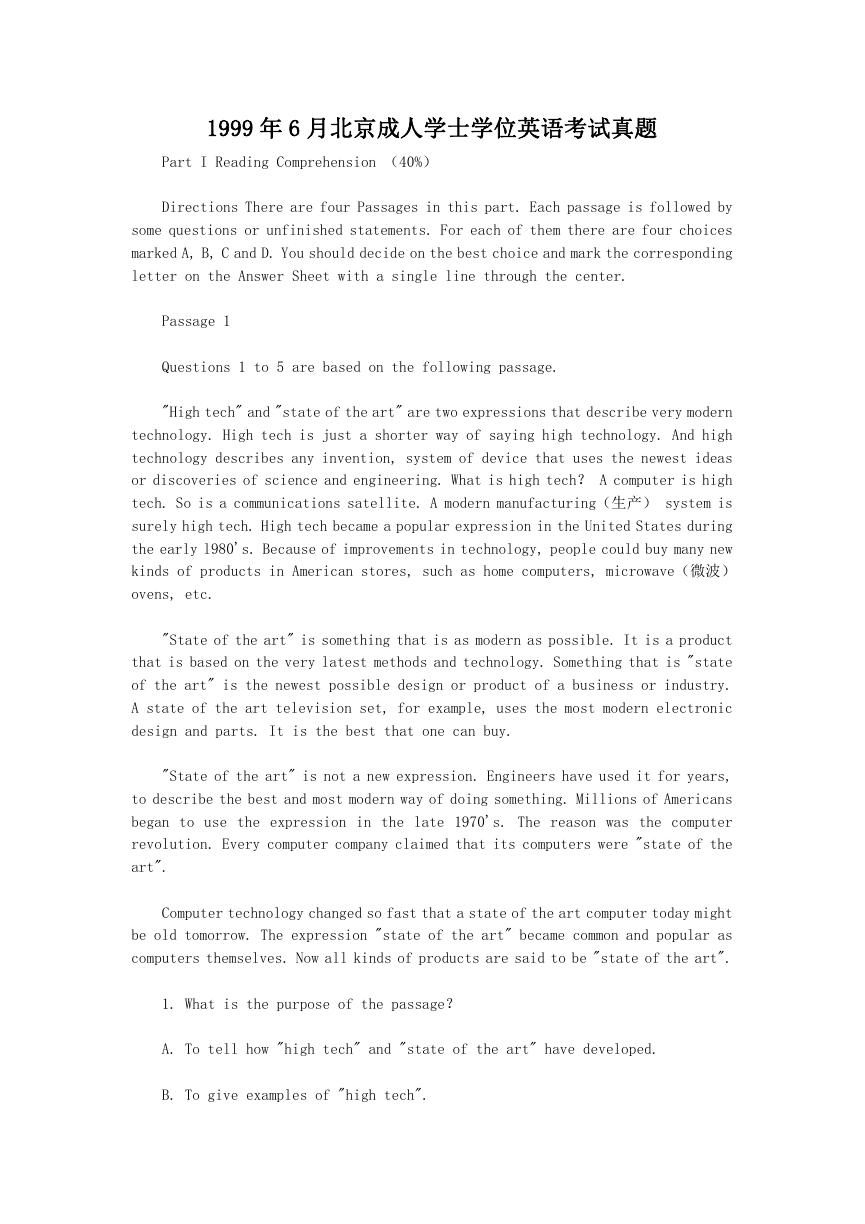

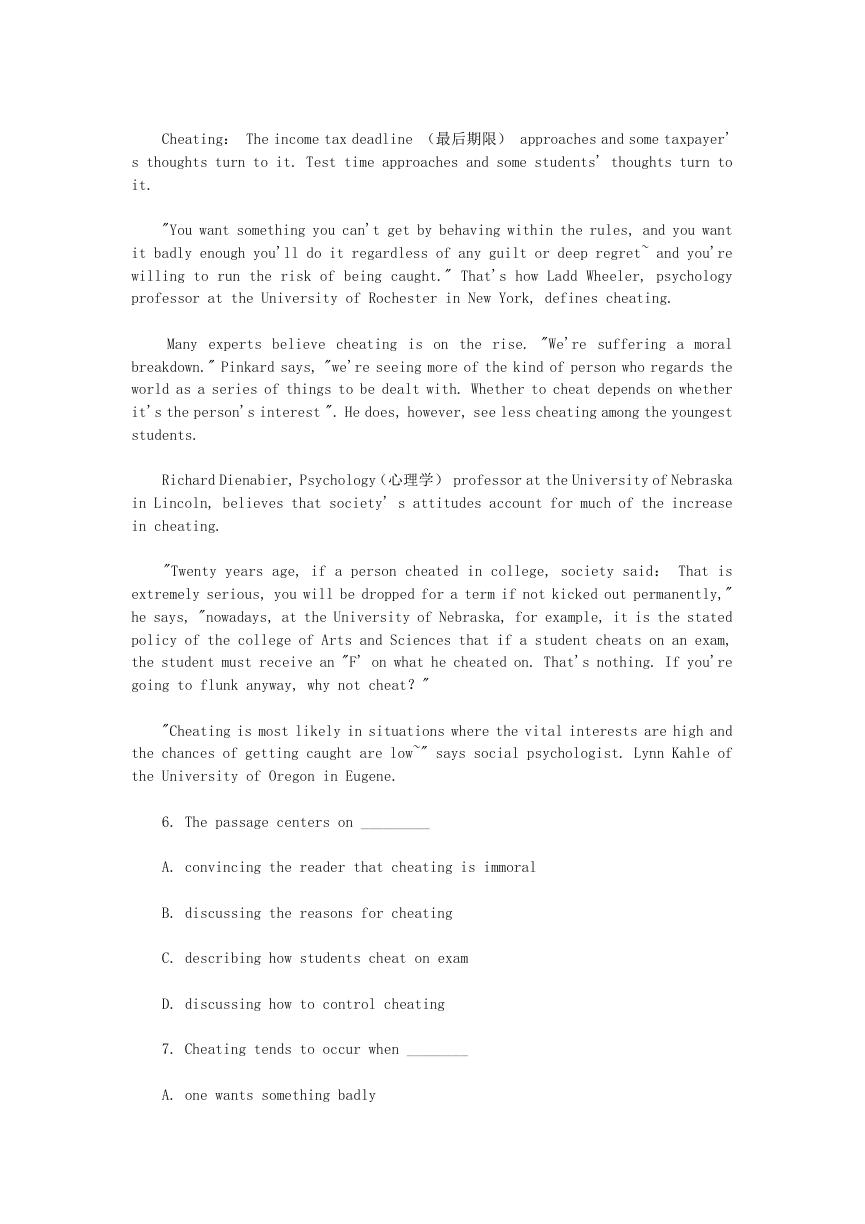

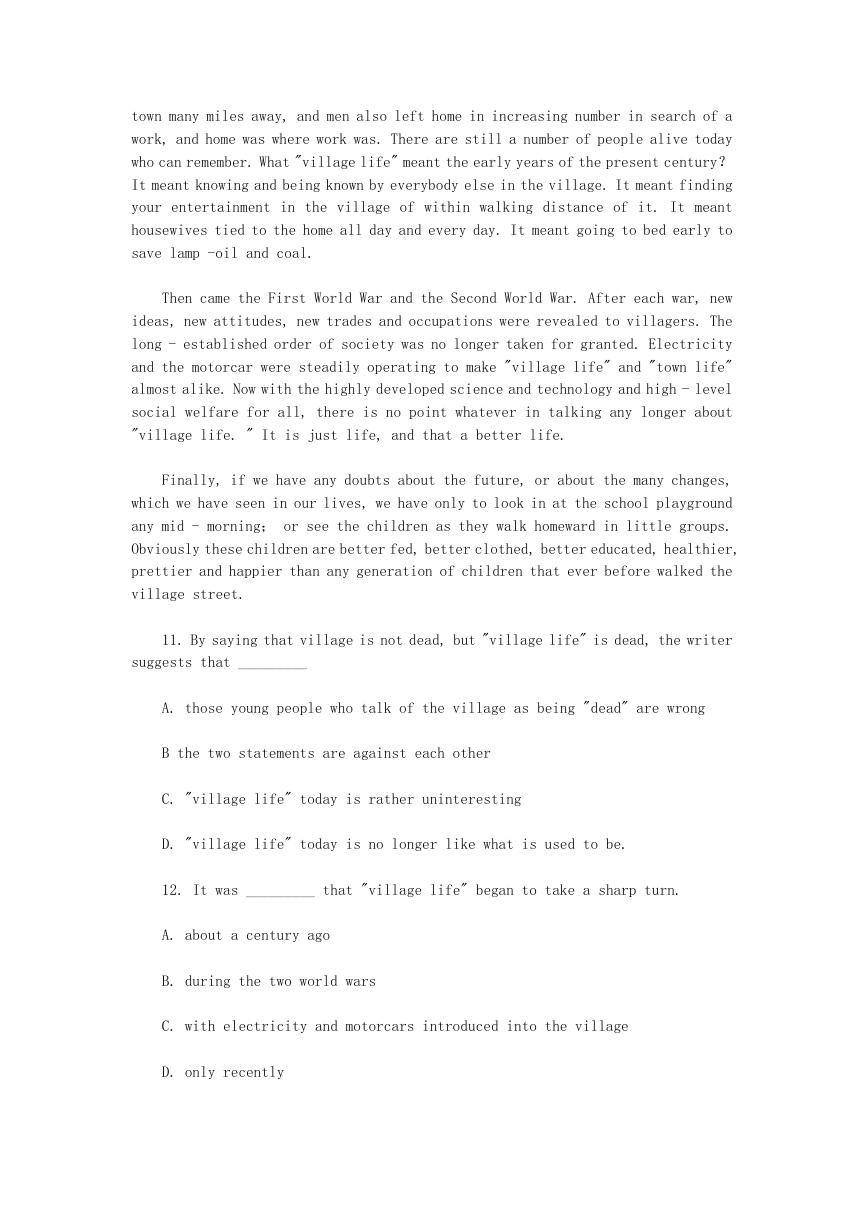
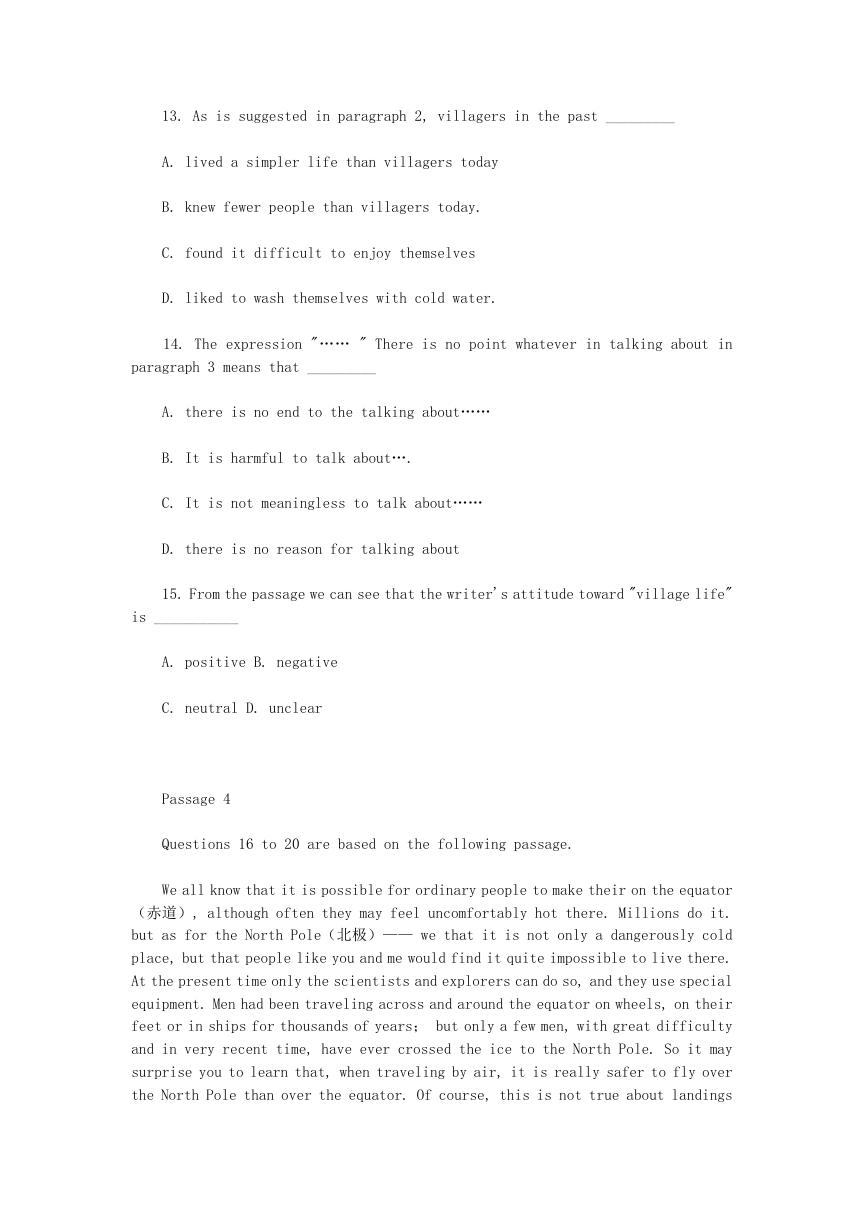
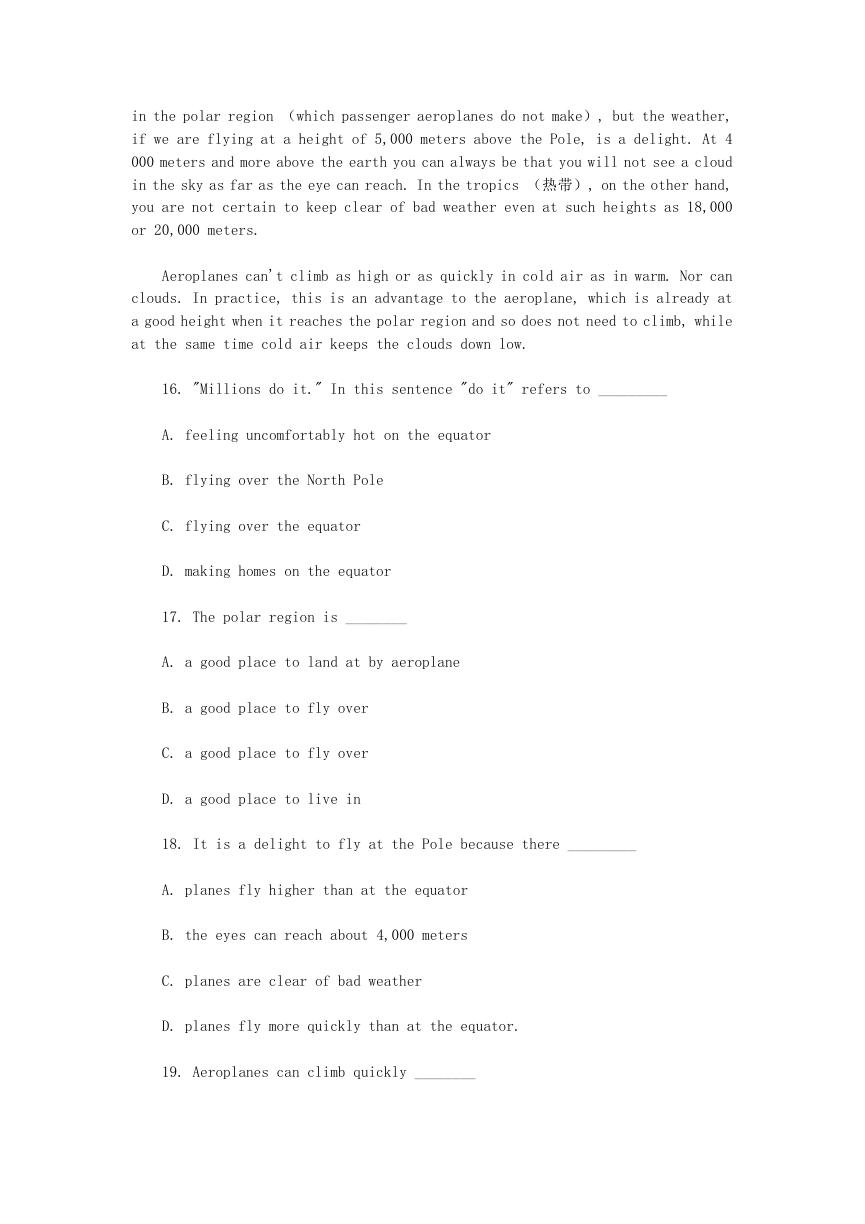
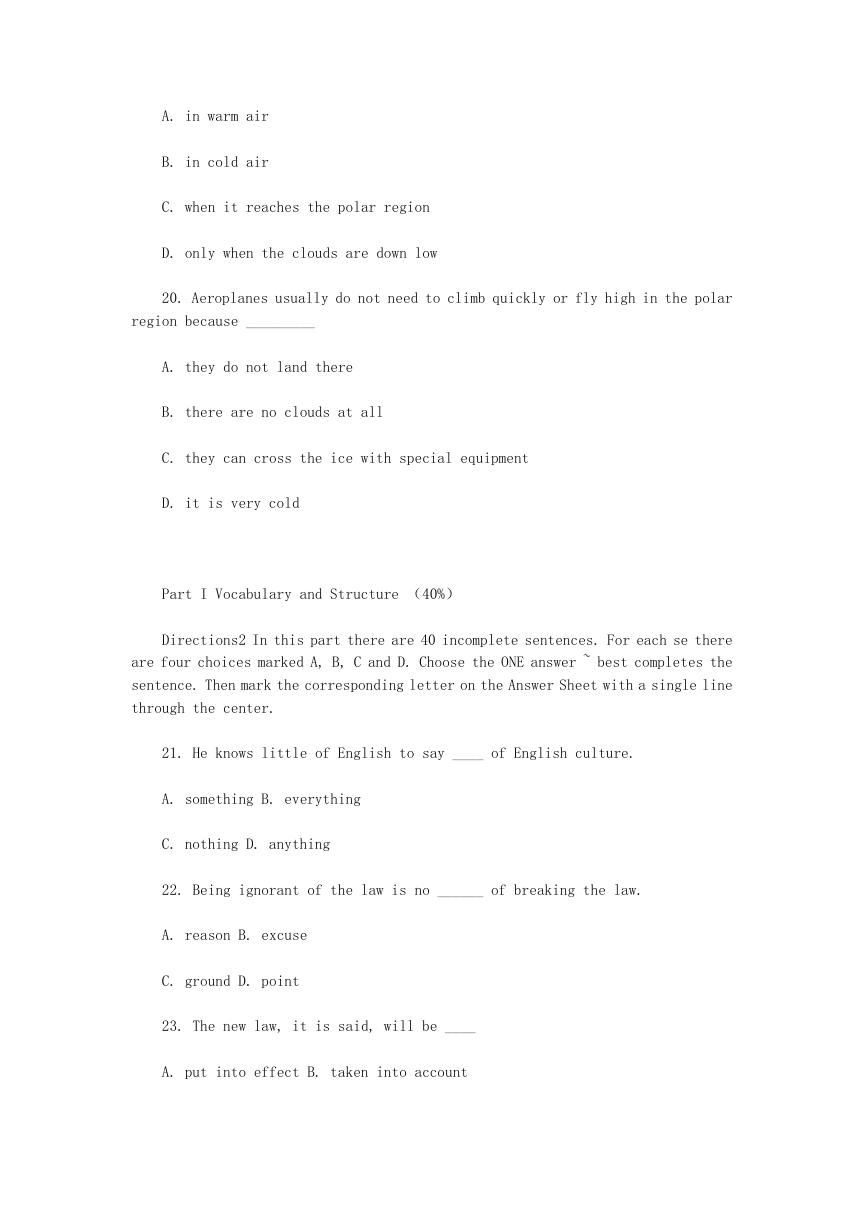








 2023年江西萍乡中考道德与法治真题及答案.doc
2023年江西萍乡中考道德与法治真题及答案.doc 2012年重庆南川中考生物真题及答案.doc
2012年重庆南川中考生物真题及答案.doc 2013年江西师范大学地理学综合及文艺理论基础考研真题.doc
2013年江西师范大学地理学综合及文艺理论基础考研真题.doc 2020年四川甘孜小升初语文真题及答案I卷.doc
2020年四川甘孜小升初语文真题及答案I卷.doc 2020年注册岩土工程师专业基础考试真题及答案.doc
2020年注册岩土工程师专业基础考试真题及答案.doc 2023-2024学年福建省厦门市九年级上学期数学月考试题及答案.doc
2023-2024学年福建省厦门市九年级上学期数学月考试题及答案.doc 2021-2022学年辽宁省沈阳市大东区九年级上学期语文期末试题及答案.doc
2021-2022学年辽宁省沈阳市大东区九年级上学期语文期末试题及答案.doc 2022-2023学年北京东城区初三第一学期物理期末试卷及答案.doc
2022-2023学年北京东城区初三第一学期物理期末试卷及答案.doc 2018上半年江西教师资格初中地理学科知识与教学能力真题及答案.doc
2018上半年江西教师资格初中地理学科知识与教学能力真题及答案.doc 2012年河北国家公务员申论考试真题及答案-省级.doc
2012年河北国家公务员申论考试真题及答案-省级.doc 2020-2021学年江苏省扬州市江都区邵樊片九年级上学期数学第一次质量检测试题及答案.doc
2020-2021学年江苏省扬州市江都区邵樊片九年级上学期数学第一次质量检测试题及答案.doc 2022下半年黑龙江教师资格证中学综合素质真题及答案.doc
2022下半年黑龙江教师资格证中学综合素质真题及答案.doc